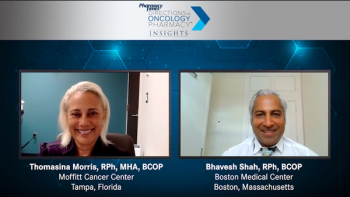
The #PizzaIsNotWorking campaign originated because free pizza or other mundane incentives do not adequately address the unrealistic expectations in pharmacies, which lead to an emphasis on metrics rather than patient safety.

The #PizzaIsNotWorking campaign originated because free pizza or other mundane incentives do not adequately address the unrealistic expectations in pharmacies, which lead to an emphasis on metrics rather than patient safety.

Bhavesh Shah, RPh, BCOP, reviews data and results from the ARIEL3 trial that studied the PARP inhibitor, rucaparib, for the management of ovarian cancer.

Sumaya Jaludi, PharmD, instructor for pharmacy technology at Carrington College, discusses the importance of pharmacy technicians for National Pharmacy Technician Day, especially during the COVID-19 pandemic.

Jennifer Andrews, MD, pediatric hematologist-oncologist at Vanderbilt University Medical Center and medical director of Vanderbilt University Medical Center’s blood bank, discusses what the national blood shortage may mean for health systems.

Ismail Lourido Ali, the director and counsel of policy and advocacy at the Multidisciplinary Association for Psychedelic Studies (MAPS), discusses what MAPS is, and how MAPS is engaged with the field of psychedelic medicine and its use in health care.

Meredith Ayers, CPhT, pharmacy technician at Bremo Pharmacy and presenter at the annual NCPA Convention 2021, discusses the expanding role of pharmacy technicians.

Stacy Miller, senior content management consultant for Wolters Kluwer Health, discusses how mental health in the United States could be improved by stronger connections between prescribers and pharmacists.

Pezzino discussed new specific prescriptions and treatments compared to current treatment modalities, indications and routes of administration of new drugs in the community setting, and important pharmacokinetic properties of these new drugs.

Kelsey Ramsden, CEO of Mind Cure Health, said research into the use of MDMA-assisted therapy could have a huge impact on the treatment of female hypoactive sexual desire disorder.

Aysha Akhtar, CEO and co-founder for the Center for Contemporary Sciences discusses the FDA Modernization Act of 2021, aiming to modernize the drug testing process by allowing the use of other testing methods as an alternative to animal testing.

Ching discussed topics such as additional testing services, recommendations for point-of-care services, and strategies to help increase point-of-care testing services.

Lindy Bancke, PharmD, head of clinical development at Rebiotix Inc, said the clinical development program of RBX2660 is showing promise in the treatment of recurrent C. Difficile infection.

Mark Becker, the CEO of Vivacare, discusses how health care professionals can counsel patients on eczema treatment and care so they can help to deter patients from googling their symptoms and developing what can be termed “medical anxiety.”

In an interview with Pharmacy Times®, Mitchell Barnett, PharmD, MS, associate director of the Iowa Prescription Monitoring Program for the Iowa Board of Pharmacy, and Mylo Wells, PharmD, owner of Wells Hometown Drug, discuss Iowa’s new drug disposal kit program and the impact it could have on the opioid epidemic.

Anjanette Wyatt, PharmD, said pharmacists can play a major role in helping patients distinguish trustworthy facts from misinformation.

Musey addressed any gaps and limitations that researchers should be focusing on in future studies and what he hopes to see for the future of pneumococcal vaccines and this disease.

National Community Pharmacists Association (NCPA) President Brian Caswell, RPh, said he is incredibly proud of the work community pharmacists have done over the past year.

Bhavesh Shah, RPh, BCOP; and Thomasina Morris, RPh, MHA, BCOP, detail what makes a patient eligible to receive PARP inhibitors as second-line maintenance for the management of ovarian cancer.

Michael Frank, CEO of Revive Therapeutics, and Derrick Welsh, COO of Psilocin Pharma, a division of Revive Therapeutics, discuss clinical research investigating novel treatment targets for psilocybin, such as treatment-resistant depression in patients with cancer.

Pharmacy Times spoke with Dr. Jeffrey Akers, CEO of Pharmaceutical Services at Appalachian Regional Healthcare, about how integrated technology can empower pharmacists to prioritize patient care and safety and can help prevent harmful medication events from occurring.

Jameshia Below, PharmD, assistant professor of pharmacy practice at the University of Louisiana Monroe College of Pharmacy, explains how oncologic emergencies present in patients, and how each type can be recognized.

Anna Legreid-Dopp, PharmD, Senior Director of Clinical Guidelines and Quality Improvement at the American Society of Health-System Pharmacists discusses Pfizer’s request to approve their COVID-19 vaccine for children 5 to 11.

Musey discussed the highlights of the new data and how these 2 studies are different than previous studies in this topic area.

Kelan Thomas, PharmD, MS, associate professor of clinical sciences at Touro University California College of Pharmacy, discusses key points to consider regarding co-administration of MDMA, psilocybin, and ketamine with psychiatric medications, such as SSRI or SNRI antidepressants.

In an interview with Pharmacy Times®, Rita Carreón, VP of health at UnidosUS, discusses the impact of the COVID-19 educational mobile tour, launched by AARP and UnidosUS.

Jameshia Below, PharmD, an assistant professor of pharmacy practice at the University of Louisiana Monroe College of Pharmacy, explains what oncologic emergencies are and how they are classified.

Michael Frank, CEO of Revive Therapeutics, discussed the results of a phase 3 trial investigating bucillamine as an oral at-home pill for the treatment of COVID-19 symptoms.

Peter Lio, MD, discusses patient factors to consider before deciding on a treatment strategy for atopic dermatitis.

Jamie L. McConaha, PharmD, NCTTP, BCACP, CDE, provides an overview of atopic dermatitis.

Two board-certified oncology pharmacists review the importance of PARP inhibitors for second-line maintenance in treating ovarian cancer.